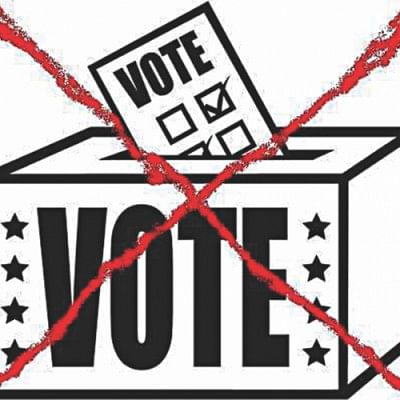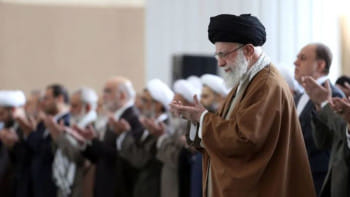Option for “no votes” and credible elections

The term "no votes" is defined as the "option to choose not to vote for any political candidate in an election". Generally, the term "None Of The Above", or NOTA for short is used to denote no votes in elections; sometimes, "against all" or a "scratch vote" or a "blank ballot" is also used as a ballot option in some jurisdictions or countries. Whatever the term is, NOTA is most common and is designed to allow the voter to indicate disapproval towards all the candidates in a voting system.
Although NOTA is widely used in referendums, few countries in the world have this provision in parliamentary as well as in local body elections. The idea of NOTA originated in 1976 when the Isla Vista Municipal Advisory Council passed a resolution to put it forward in the official electoral ballot, in the County of Santa Barbara, California, in the US. However, NOTA was first introduced in 1978 by the State of Nevada.
In India, after filing a public litigation statement in favour of NOTA by The People's Union for Civil Liberties, an NGO, in 2009, the Election Commission of India (ECI) asked the Supreme Court to offer the voter a "None of the above" option on the ballot as it would give voters the freedom of not selecting any undeserving candidate. Although the Indian government was not in favour of such an idea, on September 27, 2013, the Supreme Court of India ordered the ECI to provide a NOTA button in all voting machines.
There are two types of NOTA used in elections—symbolic NOTA and meaningful NOTA. When symbolically used, NOTA cannot make or mar a candidate or an election. Even if NOTA votes were the majority, that would not result in re-election or the constituency to remain vacant. Practically, symbolic NOTA is invalid and useless, even though the votes are counted; for example, in a constituency, 8 out of 10 people can vote NOTA, but there would still be a winner—the candidate who gets 2 votes. This is why most political analysts say that symbolic NOTA is a waste of individual franchise and cannot have any impact on making elections credible.
India is one of the best example where NOTA is used just for symbolic purposes; for example, in the last Lok Sobha elections held in 2014, in Uttarakhand, NOTA received 1 percent of the vote share, or nearly 50,000 votes, more than the Uttarakhand Kranti Dal which got a measly 0.7 percent.
Although, I have not found any example of meaningful NOTA being used regularly, there have been a few instances where NOTA was used for meaningful purposes. In the 1989 Polish legislative election, voters were able to vote against the only candidate running, often from the ruling Polish United Workers' Party, by crossing out the candidate's name on the ballot. As a result, voters defeated the sitting prime minister and dozens of leading Communists as had they failed to get the required majority. In 1991, in the elections that led to the break-up of the Soviet Union, the Soviet version of "none of above" led to new elections with new candidates in 200 races for the 1,500-seat Congress of People's Deputies. More than 100 incumbents representing the Communist Party of the Soviet Union were defeated in the run-off, causing Boris Yeltsin to later say that the "none of the above" option had helped convince the people that they had real power even in a rigged election, and had played a role in building true democracy.
As the symbolic NOTA has no effect on making or marring a candidate or an election, or even re-election, then why does a country introduce it? Do symbolic NOTA make elections credible? Although I have already answered this question, I still strongly believe that NOTA can affect elections in at least three ways.
Firstly, voting is a formal expression of will or opinion in an electoral process. Voters must have the right to express dissatisfaction and rejection. Right to reject implies that a voter, while voting, has every right not to opt for any of the candidates during an election. Such a right implies for a choice to remain neutral. This may happen when a voter feels that none of the candidates in a candidacy deserves to be elected. It happens by way of his choice, belief, thinking and expression. Right to reject has its genus in freedom of speech and expression which is guaranteed by the Universal Declaration of Human Rights and International Covenant on Civil and Political Rights.
Secondly, it creates pressure on the political parties to improve the quality of their candidates. As NOTA option gives the voter the right to express his disapproval with the kind of candidates that are being put up by the political parties, once the political parties realise that a large number of people are expressing their disapproval with the candidates being put up by them, gradually, there will be a systemic change and the political parties will be forced to accept the will of the people and field candidates who are known for their integrity. This would gradually force political parties to field "clean" candidates, out of fear of losing votes, and bring systematic changes in polls.
Thirdly, it increases the quality of an election when there is only one candidate. A few countries in the world have provision for unopposed elections; this provision hampers the acceptability of elections as voters cannot exercise their voting rights. But, when, there is only one candidate in a constituency along with NOTA, voters at least go to polling stations and exercise their voting rights, increasing the credibility of elections.
In Bangladesh, symbolic NOTA was introduced in the 9th parliamentary elections; the election results show that only 0.55 percent votes were cast for NOTA and the highest percentage was found in the Rangamati constituency (9.66 percent). In the first session of the 9th Parliament, the provision of NOTA was taken out from the legal framework and in the 10th parliamentary elections held in 2014, there was no provision of NOTA.
However, as per article 19 of the RPO, 153 candidates were elected unopposed in the 10th parliamentary elections; as more than 50 percent of the MPs were elected unopposed, this election was criticised by the international community, election researchers and academics. But, in the 10th parliamentary elections, if there was NOTA which was introduced in 2008, voters at least could have gone to the polling stations and cast their votes where unopposed elections were held. This would have helped them to express their dissatisfaction and rejection, which certainly would have increased the credibility of the 10th parliamentary election.
A good number of stakeholders have suggested to the EC that NOTA should be reintroduced in the upcoming parliamentary elections. My suggestion is that the EC should take its decision on NOTA, taking into consideration the peoples' right to free expression in an election. Also, if there is only one candidate contesting any poll, NOTA should be used as a meaningful no vote.
Md Abdul Alim is an elections specialist, currently working as Director, Election Working Group.





Comments